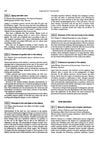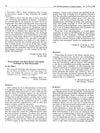 March 2000 in “Aesthetic Surgery Journal”
March 2000 in “Aesthetic Surgery Journal” Hair transplantation techniques have improved and are beneficial for aesthetic surgery practices.
 July 1999 in “Journal of The European Academy of Dermatology and Venereology”
July 1999 in “Journal of The European Academy of Dermatology and Venereology” Bath PUVA therapy works well for a skin condition without as many cancer risks and is cheaper, and iron deficiency might not cause female hair loss.
 September 1998 in “Journal of The European Academy of Dermatology and Venereology”
September 1998 in “Journal of The European Academy of Dermatology and Venereology” Aging can lead to poorer scalp and hair health, including less hair and more scalp diseases, which should be managed to help older people feel better.
 September 1998 in “Journal of The European Academy of Dermatology and Venereology”
September 1998 in “Journal of The European Academy of Dermatology and Venereology” The conclusion is that proper recognition and treatment of skin conditions are crucial for the elderly due to changes in skin, nails, and hair with age, and the impact of these conditions on health and mobility.
 September 1998 in “Journal of The European Academy of Dermatology and Venereology”
September 1998 in “Journal of The European Academy of Dermatology and Venereology” Old people's nails often have problems due to body changes, more diseases, and self-care difficulties, affecting their movement and hand use.
 September 1998 in “Journal of The European Academy of Dermatology and Venereology”
September 1998 in “Journal of The European Academy of Dermatology and Venereology” Skin fungal infections are more common in older adults due to factors like obesity, poor circulation, reduced mobility, and weakened immune defenses from certain medications.
 September 1998 in “Journal of The European Academy of Dermatology and Venereology”
September 1998 in “Journal of The European Academy of Dermatology and Venereology” Older people often have untreated genital skin diseases due to embarrassment and lack of medical attention, which can lead to discomfort and even cancer risk.
 September 1998 in “Journal of The European Academy of Dermatology and Venereology”
September 1998 in “Journal of The European Academy of Dermatology and Venereology” Aging affects hair density and skin health, and Behcet's disease, a complex condition with no specific test, involves sores and systemic issues, treated with various medications.
 July 1997 in “The Lancet”
July 1997 in “The Lancet” Finasteride increased hair count and regrowth in men with hair loss but also caused more sexual side effects than placebo.
 July 1997 in “The Lancet”
July 1997 in “The Lancet” A new protein linked to Alzheimer's was discovered, and a hair loss treatment showed effectiveness but had some sexual side effects.
 June 1996 in “The American Journal of Cosmetic Surgery”
June 1996 in “The American Journal of Cosmetic Surgery” The hair restoration technique discussed is a costly, temporary method similar to hair weaving, not well-supported by scientific data, and can have severe complications.
 February 1996 in “International Journal of Dermatology”
February 1996 in “International Journal of Dermatology” The Seoul International Dermatology Symposium was a successful event that highlighted new dermatology treatments and fostered international relations.
 December 1991 in “Annals of the New York Academy of Sciences”
December 1991 in “Annals of the New York Academy of Sciences” Keratin proteins are crucial for hair structure and strength.

Hair loss in African American women, caused by hair care, genetics, and environment, needs more research for better treatment.
 688 citations,
June 2007 in “Cell Stem Cell”
688 citations,
June 2007 in “Cell Stem Cell” Removing the ATR gene in adult mice causes rapid aging and stem cell loss.
 268 citations,
April 2009 in “International Journal of Pharmaceutics”
268 citations,
April 2009 in “International Journal of Pharmaceutics” Niosomes improve minoxidil skin delivery for hair loss treatment.
 226 citations,
September 2001 in “Journal of The American Academy of Dermatology”
226 citations,
September 2001 in “Journal of The American Academy of Dermatology” Hair loss in women is genetic, diagnosed by examination and biopsy, and treated with minoxidil, finasteride, or transplantation.
 222 citations,
October 1993 in “Journal of The American Academy of Dermatology”
222 citations,
October 1993 in “Journal of The American Academy of Dermatology” Hair loss affects women's mental health more than men's, causing anxiety, low self-esteem, and social insecurity.
 218 citations,
October 2013 in “Proceedings of the National Academy of Sciences of the United States of America”
218 citations,
October 2013 in “Proceedings of the National Academy of Sciences of the United States of America” Mice lacking the PPARγ gene in their fat cells had almost no fat tissue, severe metabolic problems, and abnormal development of other fat-related tissues.
 194 citations,
March 2003 in “American Journal of Pathology”
194 citations,
March 2003 in “American Journal of Pathology” Stress stops hair growth in mice by causing early hair growth phase end and harmful inflammation through a specific nerve-related pathway.
 185 citations,
August 2005 in “Autoimmunity Reviews”
185 citations,
August 2005 in “Autoimmunity Reviews” Alopecia areata is an autoimmune condition causing hair loss due to the immune system attacking hair follicles, often influenced by genetics and stress.
 179 citations,
July 2016 in “Nature Reviews Molecular Cell Biology”
179 citations,
July 2016 in “Nature Reviews Molecular Cell Biology” Epigenetic changes control how adult stem cells work and can lead to diseases like cancer if they go wrong.
 170 citations,
December 2009 in “Histopathology”
170 citations,
December 2009 in “Histopathology” The conclusion is that accurate diagnosis of different types of hair loss requires good teamwork between skin doctors and lab experts.
 165 citations,
August 2013 in “Lasers in Surgery and Medicine”
165 citations,
August 2013 in “Lasers in Surgery and Medicine” Low-Level Laser Therapy is effective and safe for hair growth with minimal side effects.
 163 citations,
November 2003 in “Journal of Investigative Dermatology”
163 citations,
November 2003 in “Journal of Investigative Dermatology” Low iron levels may be linked to some types of hair loss in women.
 160 citations,
January 2009 in “Clinical Drug Investigation”
160 citations,
January 2009 in “Clinical Drug Investigation” HairMax LaserComb® effectively promotes hair growth and stops hair loss in males with androgenetic alopecia, with no serious side effects.
 158 citations,
February 2000 in “Archives of dermatology”
158 citations,
February 2000 in “Archives of dermatology” Some people with pattern hair loss may also have scalp inflammation and scarring similar to lichen planopilaris.
 158 citations,
January 2015 in “Artificial Intelligence in Medicine”
158 citations,
January 2015 in “Artificial Intelligence in Medicine” DrugNet effectively identifies new uses for existing drugs and may save resources in drug development.
 155 citations,
September 2008 in “British journal of dermatology/British journal of dermatology, Supplement”
155 citations,
September 2008 in “British journal of dermatology/British journal of dermatology, Supplement” FFA is more common in postmenopausal women, can affect younger women, and may stabilize over time.
 149 citations,
April 2004 in “Journal of Dermatological Science”
149 citations,
April 2004 in “Journal of Dermatological Science” Minoxidil boosts hair growth by increasing cell production and survival.






























